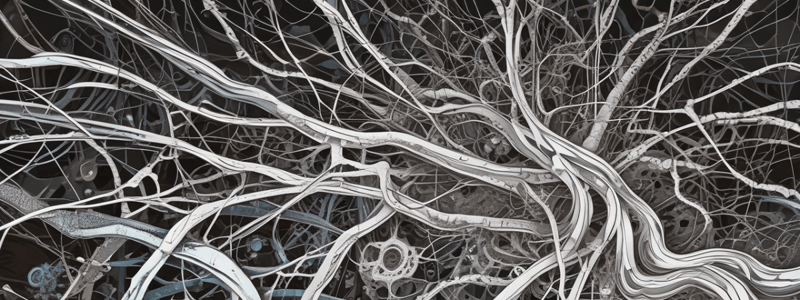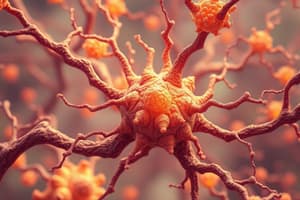Podcast
Questions and Answers
What is the famous phenomenon described in the text?
What is the famous phenomenon described in the text?
- Long-term potentiation (LTP) (correct)
- Input-specific plasticity
- Short-term potentiation (STP)
- Long-term depression (LTD)
What frequency tetanus induces the phenomenon of LTP as mentioned in the text?
What frequency tetanus induces the phenomenon of LTP as mentioned in the text?
- 50 Hz
- 1 Hz
- 100 Hz (correct)
- 200 Hz
What would low frequency tetanus of 1 Hz induce at synapses?
What would low frequency tetanus of 1 Hz induce at synapses?
- Short-term potentiation (STP)
- Synaptic saturation
- Long-term depression (LTD) (correct)
- Long-term potentiation (LTP)
What would happen if activity-dependent potentiation continued without the existence of LTD as per the text?
What would happen if activity-dependent potentiation continued without the existence of LTD as per the text?
Which stimulus frequency range induces long-term depression (LTD) at synapses?
Which stimulus frequency range induces long-term depression (LTD) at synapses?
What is the graph mapping the effects of different stimulus frequencies on synapse strength referred to as in the text?
What is the graph mapping the effects of different stimulus frequencies on synapse strength referred to as in the text?
What integrates the separated inputs into binocular representations in layers 2, 3, and 5 of V1?
What integrates the separated inputs into binocular representations in layers 2, 3, and 5 of V1?
How can segregation in ocular dominance columns of layer 4 be initiated?
How can segregation in ocular dominance columns of layer 4 be initiated?
Who hypothesized that the activity of neurons plays a critical role in the development of ocular dominance territories?
Who hypothesized that the activity of neurons plays a critical role in the development of ocular dominance territories?
Which laboratory showed that retinal neurons produce spontaneous activity?
Which laboratory showed that retinal neurons produce spontaneous activity?
What did Carla Shatz's laboratory reveal using calcium imaging?
What did Carla Shatz's laboratory reveal using calcium imaging?
Where can waves of activity passing through the retina be recorded?
Where can waves of activity passing through the retina be recorded?
What impact does raising animals in the dark have on Hebbian synaptic plasticity in the primary visual cortex?
What impact does raising animals in the dark have on Hebbian synaptic plasticity in the primary visual cortex?
How does low frequency stimulation affect synaptic plasticity in dark-reared animals compared to those raised under normal lighting?
How does low frequency stimulation affect synaptic plasticity in dark-reared animals compared to those raised under normal lighting?
At what frequency does higher frequency stimulation induce more LTP in animals raised in the dark?
At what frequency does higher frequency stimulation induce more LTP in animals raised in the dark?
What is the expected impact of dark exposure on visual function following monocular deprivation in adult animals?
What is the expected impact of dark exposure on visual function following monocular deprivation in adult animals?
What was the major visual deficit observed in kittens that underwent monocular deprivation through the critical period according to Donald Mitchell's laboratory?
What was the major visual deficit observed in kittens that underwent monocular deprivation through the critical period according to Donald Mitchell's laboratory?
What is a key difference between the visual acuity of the deprived eye and the open eye in kittens following monocular deprivation?
What is a key difference between the visual acuity of the deprived eye and the open eye in kittens following monocular deprivation?
What is a key factor in determining the opening and closing of the critical period?
What is a key factor in determining the opening and closing of the critical period?
What happens to vision limited to the deprived eye in animals?
What happens to vision limited to the deprived eye in animals?
What does the text imply about the recovery of visual experience post-critical period?
What does the text imply about the recovery of visual experience post-critical period?
What do monocularly deprived kittens demonstrate after about a week of opening their previously closed eye?
What do monocularly deprived kittens demonstrate after about a week of opening their previously closed eye?
In the context of visual cortical critical periods, what varies from one species to another?
In the context of visual cortical critical periods, what varies from one species to another?
What has research by Mark Bear and Takao Hensch focused on regarding critical periods?
What has research by Mark Bear and Takao Hensch focused on regarding critical periods?
What term is used to describe the period during which defining plasticity is permitted?
What term is used to describe the period during which defining plasticity is permitted?
In the context of the text, what does the term 'critical period' refer to?
In the context of the text, what does the term 'critical period' refer to?
What is the consequence of monocular deprivation in five-week-old kittens?
What is the consequence of monocular deprivation in five-week-old kittens?
Why is the attachment formed during a critical period described as unbreakable in the text?
Why is the attachment formed during a critical period described as unbreakable in the text?
What is one area where the concept of the critical period has had influence, as mentioned in the text?
What is one area where the concept of the critical period has had influence, as mentioned in the text?
What would be the result of a reverse suture of the opposite eye after monocular deprivation in kittens?
What would be the result of a reverse suture of the opposite eye after monocular deprivation in kittens?
Flashcards
LTP
LTP
A type of synaptic plasticity that strengthens connections between neurons, lasting for at least an hour. It's triggered by high-frequency stimulation.
LTD
LTD
Opposing LTP, LTD is a form of synaptic plasticity that weakens connections between neurons. It's induced by low-frequency stimulation.
Synaptic Plasticity
Synaptic Plasticity
The ability of synapses to change their strength over time, through mechanisms like LTP and LTD. It's crucial for learning and memory.
High-Frequency Tetanus
High-Frequency Tetanus
Signup and view all the flashcards
Low-Frequency Tetanus
Low-Frequency Tetanus
Signup and view all the flashcards
Modification Curve
Modification Curve
Signup and view all the flashcards
Critical Period
Critical Period
Signup and view all the flashcards
Monocular Deprivation
Monocular Deprivation
Signup and view all the flashcards
Effects on Visual Cortex
Effects on Visual Cortex
Signup and view all the flashcards
Reversible Effects
Reversible Effects
Signup and view all the flashcards
Ocular Dominance Columns
Ocular Dominance Columns
Signup and view all the flashcards
Binocular Representation
Binocular Representation
Signup and view all the flashcards
Spontaneous Activity
Spontaneous Activity
Signup and view all the flashcards
Retinal Waves
Retinal Waves
Signup and view all the flashcards
Dark-Rearing
Dark-Rearing
Signup and view all the flashcards
Altered Inhibition
Altered Inhibition
Signup and view all the flashcards
Shifted Modification Threshold
Shifted Modification Threshold
Signup and view all the flashcards
Reduced LTD
Reduced LTD
Signup and view all the flashcards
Increased LTP
Increased LTP
Signup and view all the flashcards
Visual Acuity
Visual Acuity
Signup and view all the flashcards
Binocular Vision
Binocular Vision
Signup and view all the flashcards
Functional Blindness
Functional Blindness
Signup and view all the flashcards
Species Variation
Species Variation
Signup and view all the flashcards
Cortical Inhibition
Cortical Inhibition
Signup and view all the flashcards
Study Notes
LTP and LTD
- LTP (Long-term Potentiation) is a form of synaptic plasticity that can last for at least an hour, and is induced by high-frequency tetanus (100 Hz) in one pathway.
- LTD (Long-term Depression) is the reverse phenomenon, also a form of synaptic plasticity, induced by low-frequency tetanus (1 Hz) in the same pathway.
- Both LTP and LTD can be observed longitudinally at the same synapses.
- A modification curve shows the effects of different stimulus frequencies on the strength of synapses, with low frequencies inducing LTD and higher frequencies inducing LTP.
Critical Period
- The concept of a critical period refers to a brief window during which defining plasticity is permitted, and has been influential in education, psychology, psychiatry, and neuroscience.
- The critical period is relevant to the effects of visual experience in deprivation on the neocortex of mammals.
- In kittens, the effects of monocular deprivation are highly reversible if the deprivation occurs during an early critical period.
Visual Cortex and Ocular Dominance
- In the visual cortex, intracortical connections integrate separated inputs into binocular representations in layers 2, 3, and 5.
- Ocular dominance columns in layer 4 can arise from activity within the nervous system, rather than genetic programming.
- Spontaneous activity in retinal neurons can lead to waves of activity that pass across the retina, influencing the development of ocular dominance territories in the brain.
Dark-Rearing and Visual Function
- Dark-reared animals have altered inhibition and a shifted modification threshold, leading to reduced LTD and increased LTP in response to different stimulus frequencies.
- The expectation is that dark exposure could reduce the impact of monocular deprivation or recover lost visual function in adult animals.
Visual Acuity and Critical Period
- Kittens that underwent monocular deprivation during the critical period retain major visual deficits long after the eye is open.
- Visual acuity can be tested independently through each eye, and monocularly deprived kittens show normal binocular vision a week or so after the eye is open post-critical period.
- However, vision limited to the deprived eye never recovers, and the animals remain functionally blind through this eye.
Species Variation in Critical Period
- The visual cortical critical period varies in time and longevity from one species to another, with closure of the critical period occurring around 8-9 weeks, months, or years depending on the species.
- Cortical inhibition is a key determinant of both the opening and the closing of the critical period.
Studying That Suits You
Use AI to generate personalized quizzes and flashcards to suit your learning preferences.



